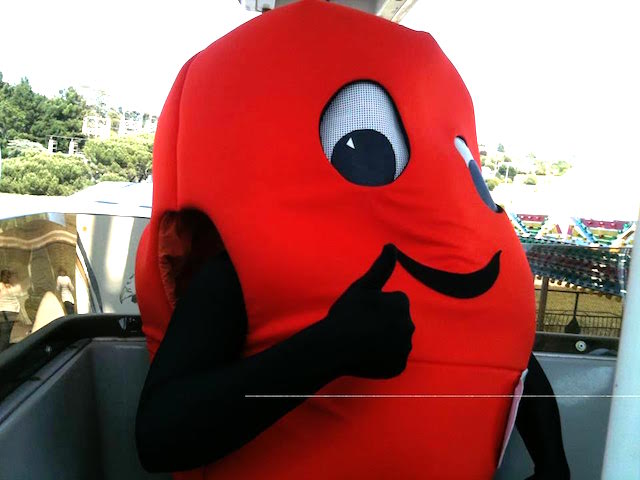
Once upon a time, I was a carrot.
One of my roommates had offered me the part time gig as “Rooty” the carrot, a mascot for a farm-to-door vegetable delivery company expanding into the Bay Area. After a number of failed attempts at finding work through San Francisco Craigslist—all while I endured the mix of confusion and desperation that could only be the result of having just left grad school—I accepted his offer.
There was no better time to practice mindfulness than when I wore my full black onesie, peering into the world through the awkward, orange lens of Rooty.
Becoming a vegetable was the first job I’d had in over a year. I’d been full of ideas on how I would successfully navigate life, but all those just left me living on food stamps and couch surfing. My ideas weren’t “bad” in and of themselves. Actually, they were quite inspired. The previous year I had been working on a Ph.D. in Social Anthropology and living in a beautiful flat with caring roommates who had been my longtime friends since college. I sang in a choir. I maintained a semblance of having my sh*t together.
And yet, the year before I became Rooty, I found myself using massive amounts of marijuana, taking advantage of loved ones, and living unemployed (and unemployable) in an energetic, spiritual vacuum.
The path into addiction can be cunning and baffling. For the most part, I never felt like I had a choice in it. It was like driving up on terrible traffic or waking up to an onset of food poisoning. Totally unexpected—but did I deserve it? Unconsciously, I had begun practicing some habits that seemed innocuous enough on their own, but a fog soon settled over my life as I kept putting them together over and over.
Coping with pain, emotional or physical, requires masterful acceptance or really strong drugs. I went with drugs—and they worked for a long time. I used them in direct proportion to the suffering brought on by my flight from responsibility, and I used them until I found my “bottom.”
The great thing about bottoms is that the only way out is up. Though I didn’t particularly like it, “Rooty” was life looking up for me. Life, it seemed, was going to instruct me in humility after all, despite (or perhaps because of) my poor choices.
I mean, who likes humility anyway? Humility looks a lot like weakness and ignorance. Humility is frightening and doesn’t pay well. Humility isn’t something you can sell in an interview very well.
Our society rewards knowing, decisiveness, solutions, and strength. The markets can only handle “mindfulness” when it’s integrated in the workplace and produces quantifiable financial returns: “You can meditate, but just not during peak hours.” (My mentor told me a story about a monk in training who when worried about his busy schedule asked his guru how he had time to meditate for an entire hour. The guru, with a twinkle in his eye explained that on his really busy days, he meditates for two hours just to be sure.)
But the truth is, practicing humility helps interrupt the cycles of violence that unfold all around us, particularly as they relate to being violent toward ourselves. Practicing humility introduces the mindset and attitudes that serve as the ground upon which real empowerment can blossom. The word itself comes from the Latin root “humus,” meaning “earth” or “ground.” In agriculture, humus refers to dark organic matter in soil that’s rich from years of animal and plant decomposition. It is rich precisely because it has undergone a process of transformation—the “life-force” of soil.
There is no transformation, no resurrection—plant, human, or otherwise—without humility.
Humility began for me in that carrot suit. It was all I deserved and could do: be the best carrot I could be. Practicing humility is about living “right-sized,” and at that time, wearing my black onesie in the orange world of Rooty fit me well. I got to channel my anger into obnoxiousness toward children as I yelled: “Eat ya’ carrots!” in a New York accent. I was the best dancing carrot you’ve ever seen!
Yes, I was transforming from behind the orange gaze.
The challenging periods came often, and at times, I was seething angry at God, at myself, and my circumstance. I would argue and plead within my mind, “How could I have gone from working on a Ph.D. with some of the brightest, most inspired people on the planet, with so much opportunity…to selling my time for money in a carrot suit!?”
I would try to justify fleeing, leaving my duty, my job—but in those moments, my intuition would remind me that I had agreed to go to any length for recovery. It was the memory of my brokenness and my addiction that brought to the fore a gentle reminder that choosing to stay in that carrot suit was somehow keeping me sober. My carrot suit was a literal and symbolic act of surrendering my life and will over to the care of a higher power. I was always welcome to take back the reins and try to live life on my own terms, but I had already proven that until I’d healed, that approach would only lead to addiction, over and over again.
Since my days as Rooty, I now have a little clearer view of the path, a little more understanding and experience. Humility, like all the other spiritual principles one might name, is a practice. The practice of humility is the path. In each moment, we are asked if we’re willing to let go of our obsessive control of our lives so that we can be open to learning, to growing, to grounding—despite the suffering life also brings. We are being asked to let go, moment after moment, for the sake of healing and humility. And when we can mindfully accept this truth, we allow humility—that rich, transformative, life-giving soil—to do its job making us more ready and mature for the new things just waiting to be born from us.
~
~
Author: Adam Hudson
Image: Author’s own
Editor: Callie Rushton
Copy Editor: Catherine Monkman
Social Editor: Nicole Cameron











Read 0 comments and reply